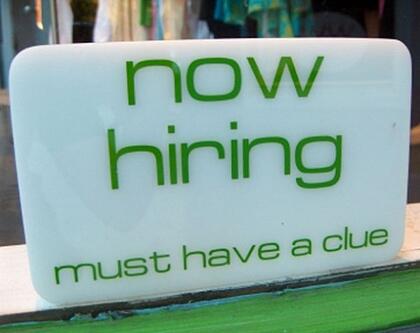 Lou Adler made a wonderfully salient point: “Stop writing boring ads!”
Lou Adler made a wonderfully salient point: “Stop writing boring ads!”
Writing an effective job post lowers barriers-to-entry so you can reach more top performers. Treat the post like a sales opportunity; you’re selling more than just a frenzy of skill sets—you’re selling an opportunity to fulfill a person’s needs.
The Adler Group offers some solid examples of job ad work they’ve done for clients: JOATs Wizard & “Oscar Winning Controller.”
“Modify the job to fit the person, rather than find a perfect person to fit an imperfect job. A subjective list of skills and experiences is neither objective nor predictive of performance.”
Below is a much abbreviated outline of some simple guidelines that may help. For more guidelines on how to craft tech-based posts check out Github’s “How to write a great job post.”
Don’t Fear Being a Touch Informal
With anything you write, you need to engage the reader with a strong hook—pulling them into your mini-narrative. For an effective job post, worry less about crafting sentences with a formal business tone and concentrate on getting out some streamlined, pithy, sentences peppered with either humor or unexpected phrases.
In the JOATs Wizard example, the job description opens with an emphasis on being conversational: “This is just about the oddest job you’ll ever see. It could also be the best.” Just like that you have the candidate feeling like they’re about to take part in a dialogue. Don’t be afraid to ask questions either; get your candidates to think. There are many ways to do this, but here are a couple examples:
Fun (from a Moz post for Software Developer in Big Data): “You want to solve really hard problems using cutting-edge web technologies with a team of smart and somewhat goofy people who take a surprising amount of joy from lobby karaoke contests, dance-offs, themed parties, ping pong tournaments and Poker?”
Reflective: “How do you imagine your future?”
Title
You may one to consider doing more than saying “Data Engineer,” “Software Developer,” or “Full-Stack Engineer.” Try being inventive so you’ll get noticed. See if it makes a difference: “Big Data Powerhouse” or “Better than Bacon Developer.”
Simple Body
Over-explaining your company, the position, and necessary skill sets is going to leave your readers with dry, red eyes. If you’re going to mention some of the things that make your company proud—that’s great—just be quick and make sure people can relate to it. Don’t assume that your company’s most technical achievements will be all that interesting. Just sell why you’re different and move on.
Be transparent about their responsibilities. Make sure people will like what they see by being realistic (this holds true for the qualifications section). Don’t scare people off—just put a twist on this section so people can see a little flexibility in their role. Don’t forget to give them a sense that they’re free to be creative (there’s no need to reference stuffy and rigid responsibility lists—we’ve all seen plenty).
This seems obvious, but it’s difficult to do. Make the post match your company culture. If you’ve worked hard to cultivate a fun workplace, write in a way that reflects how you value open-minded people who love contributing to core values. Use the prose to demonstrate what you value and link back to landing pages or articles that cover your unique culture. Zappos does a great job of this.
Balancing Needs with Nice to Haves
We’ve all seen the bullet points of skills, and many times the same format for responsibilities. Keep it short and sweet. Like Github says: “When listing skills, please avoid including every available technology in the world. Perhaps just list the main ones in order of importance.”
Beyond this, make sure that what is essential to have is not confused with what is a bonus to have. Don’t beat around the bush; just let them know by outright saying “nice to haves.”
If you must make each skill set bullet point longer than one sentence—end on a nice note that implies the details. Here’s a good example from the “Oscar Winning Controller” ad: “Prepare a monthly analysis and reporting package that identifies what’s really happening in the company. Cool charts and graphs would help.”
Personable Ending
Leave them simply. Here’s the end of the JOATs Wizard ad: “If you like what you see, you’ll like what we do. We want to bring on people who want to help us get much better at what we do.”
You can also leave them with a touch of curiosity by sayings something like the following: “Seem like you’re a good fit? Want to know more about what we think? Contact us.”

